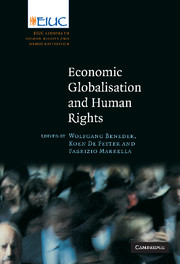Book contents
- Frontmatter
- Contents
- List of contributors
- Series editors' preface
- Preface
- List of abbreviations
- Introduction
- PART I Inter-disciplinary Perspectives on Human Rights and Economic Globalisation
- PART II The Relevance of Human Rights for International Economic Organisations
- The World Trade Organization and Human Rights
- Making Trade Policies More Accountable and Human Rights-Consistent: A NGO Perspective of Using Human Rights Instruments in the Case of Access to Medicines
- The Bretton Woods Institutions and Human Rights: Converging Tendencies
- PART III International Corporate Accountability
- Index
Making Trade Policies More Accountable and Human Rights-Consistent: A NGO Perspective of Using Human Rights Instruments in the Case of Access to Medicines
Published online by Cambridge University Press: 09 July 2009
- Frontmatter
- Contents
- List of contributors
- Series editors' preface
- Preface
- List of abbreviations
- Introduction
- PART I Inter-disciplinary Perspectives on Human Rights and Economic Globalisation
- PART II The Relevance of Human Rights for International Economic Organisations
- The World Trade Organization and Human Rights
- Making Trade Policies More Accountable and Human Rights-Consistent: A NGO Perspective of Using Human Rights Instruments in the Case of Access to Medicines
- The Bretton Woods Institutions and Human Rights: Converging Tendencies
- PART III International Corporate Accountability
- Index
Summary
Trade is not only the driving force behind economic globalisation, but also a major influence on the extent to which States can implement economic, social and cultural policies. Indeed, trade rules, including those of the World Trade Organization (WTO), are increasingly curtailing the policy space of States. Without sufficient policy flexibility to adapt trade agreements to national circumstances and development goals, States can find themselves in a position where trade rules undermine their capacity to comply with their human rights obligations. In order to address this problem, it is necessary to understand how trade rules adversely affect the enjoyment of human rights. Moreover, it is important to assess whether international human rights rules and accountability mechanisms can provide solutions capable of reducing the negative impact of trade rules on the enjoyment of human rights.
One of the first trade-related issues to involve clearly recognised human right implications is the effect of intellectual property (IP) rules on access to affordable medicines. IP protection became an international trade issue with the adoption of the WTO Agreement on Trade-Related Aspects of Intellectual Property Rights (TRIPS Agreement) in 1994. Developing countries, supported by public-interest NGOs and the international media, raised concerns about the public health impacts of the TRIPS Agreement very early on. These concerns resulted in an unprecedented political commitment: the WTO Doha Declaration on TRIPS and Public Health 2001 (Doha Declaration).
- Type
- Chapter
- Information
- Economic Globalisation and Human RightsEIUC Studies on Human Rights and Democratization, pp. 170 - 209Publisher: Cambridge University PressPrint publication year: 2007
- 2
- Cited by



